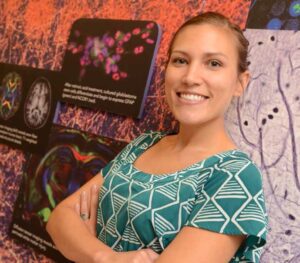
Alexis Norris, PhD, is an experienced and active member of ASHG’s public engagement and education programs. During her time as an ASHG member, she has volunteered to enrich the science-interested public’s knowledge of human genetics as a member of the Genetics Engagement & Education (GENE) Network and supported the next generation of human geneticists as a judge for the DNA Day Essay Contest. Additionally, she has led human genetics and genomics activities in high school and middle school classrooms during the ASHG Annual Meeting in a variety of locations. More recently, she supported two high school students as they completed their senior capstone project in the Project Lead the Way Biomedical Sciences program, titled “The Role of PCNA in HPV and Cervical Cancer.” Project Lead the Way is a nonprofit organization that develops STEM curricula for use by elementary, middle, and high schools in the United States. ASHG spoke with Dr. Norris about how she connected with these students, the ways in which she supported them through virtual interaction, and her favorite human genetics fact.
Using filters in the GENE Network platform, the students found Dr. Norris by searching for an ASHG member who could connect with high school-level students located in the Washington, D.C. area. Once they connected, the project began the same way many ventures begin. “We brainstormed ideas for their project,” Dr. Norris explained of their collaborative process. “Once they chose their topic, I provided feedback and resources to help them design their approach. They chose to use public gene expression data to identify biomarkers of cervical cancer.”
Virtual communication allows GENE Network members to connect both locally and with people farther away. Distance does not have to be a deterrent. Your GENE Network profile allows you to indicate if you are willing to connect virtually through the ASHG portal. Virtual connection enabled Dr. Norris and the students to work through the project. “Together, via Zoom, we went through the National Center for Biotechnology Information Gene Expression Omnibus (NCBI GEO) to identify a suitable dataset,” Dr. Norris described. “I then walked them through how to use the Geo2R tool that performs the differential gene expression analysis. They ran the Geo2R analysis, and we emailed back and forth about how to visually present the results and literature for genes that were most significant. They used Google Docs to write up their project so that I could provide edits and suggestions.”
Once the project was completed, Dr. Norris visited the virtual classroom to discuss the project with the entire class. “At the end, the students presented their project to their class, and I gave a brief introduction to their project and answered questions from the class. The class was most interested in the path I took to get where I’m at in my career.” Conversations about careers come up frequently in other GENE members’ visits with students, as Ellen Quillen, PhD and Claudia Gonzaga-Jauregui, PhD both noted in their conversations about public engagement and education with ASHG.
“I really enjoy mentoring high school Project Lead the Way Biomedical Sciences students on their capstone project,” noted Dr. Norris. “Their enthusiasm is infectious and they’re quick learners at bioinformatics! Best of all, with a bioinformatics project using public data, the student doesn’t require access to a lab to do meaningful research. This democratizes it somewhat.”
To support students and teachers in similar projects, consider connecting with local high school science departments to offer a Zoom call with the class, tour of your lab, or put on a career question and answer session. GENE Network and Public Education & Awareness Committee member Robin Williamson, PhD, who currently teaches seventh grade science, has provided recommendations for how best to partner with educators. Additionally, add your name to the interest list to be contacted as a judge for the 2022 DNA Day Essay Contest, or circulate ASHG’s latest webinar with educators – this resource is meant to supplement teachers’ discussions with students about human genetics and genomics in relation to students’ cultural competency and awareness. Finally, have your favorite human genetics fact in your back pocket to peak someone’s interest. Dr. Norris’ favorite fact is “that no one is “normal” – we’re all mutants or variants.”
